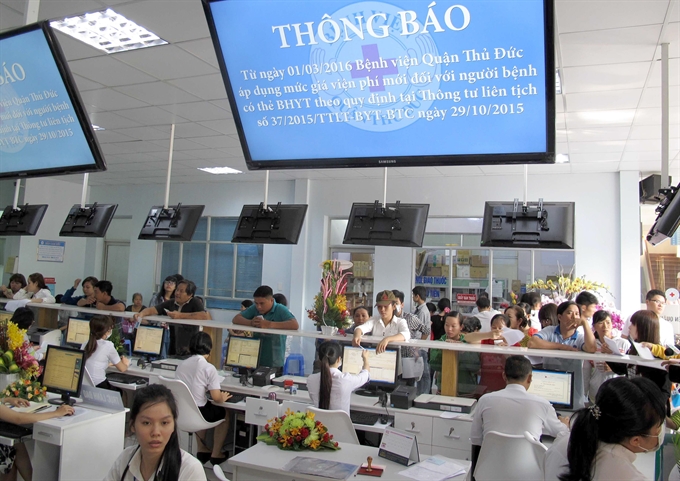 Society
Society

Prime Minister Nguyễn Tấn Dũng urges Health Ministry, provinces, and cities to ease hospital overcrowding and expand satellite hospital networks.
 |
| The Thủ Đức Hospital uses LCD screens to inform about new fee policies in Thủ Đức District, HCM City. Nearly 1,900 different services and products at public hospitals became about 30 per cent more expensive as of March 1.— Photo Phương Vy |
HÀ NỘI — Prime Minister Nguyễn Tấn Dũng has urged the Health Ministry, provinces and cities to take measures to improve the efficiency of satellite hospital networks and ease hospital overcrowding.
Two years ago, the Prime Minister initiated a project to build and develop satellite hospitals through 2020. As part of this project, satellite hospitals must be provided with technical and surgical training by core hospital staff. This additional training will enable satellite hospitals to better serve their patients, as well as increasing the professional qualifications of satellite hospital staff.
Associate Professor Lương Ngọc Khuê, head of the Medical Examination and Treatment Department, said that during the past two years of implementing the project, the health minister -- and People’s Committees of provinces and cities across the country -- recorded several improvements.
A network of 15 core hospitals and 53 satellite hospitals in 38 provinces and cities have been established. Numerous hospitals have been upgraded. And many new hospitals have been constructed.
But some satellite hospitals participating in the project have seen a lack of adequate investment in medical equipment, facilities, and technical training conducted by core hospital staff.
The health ministry must oversee the training of satellite hospital staff by core hospital staff. The health ministry is responsible for ensuring that core hospital staff train satellite hospital staff appropiately.
Dũng also asked the health ministry to publish a list of eligible core hospitals -- and to enforce regulations requiring experts and doctors working at core hospitals to conduct examinations and treatments at satellite hospitals -- as soon as possible.
He emphasised that both private and State-owned hospitals should be considered equally for core and satellite hospital designation.
Other urgent tasks include: calling for investment to build new private hospitals, in co-operation with State-owned hospitals; fostering the use of information technology; developing telemedicine, in which telecommunications are used to provide remote healthcare; and cultivating the family-doctor model of care.
According to the new regulations, the Ministry of Planning and Investment must prioritise the purchase of medical equipment and facilities, using Official Development Assistance money. The Ministry of Finance must prioritise its spending to ensure that hospital overcrowding is solved.
Two weeks after the Ministry of Health increased prices for medical services at public hospitals on March 1, State-owned and private hospitals are enforcing the new fees.
Nearly 1,900 different services and products at public hospitals became about 30 per cent more expensive as of March 1.
The new fee policies require patients to pay for things that used to be subsidised by the Government — such as power, water, equipment maintenance, waste treatment facilities, training, research, and more.
Patients are very concerned about this new 30 per cent rise in medical costs. Patients wonder: Will the quality of medical services rise with the fees? How will the fee hike affect patients, especially old people and poor people?
Đặng Thị Lan, a resident of Lê Chân District of Hải Phòng City, worried that the sharply increased medical service fees would be a financial burden for her.
However, Tăng Xuân Khoa, deputy director of Hải Phòng’s Kiến An General Hospital, says that the fee hike will not affect patients, especially not poor people or children. Poor patients are still eligible for free healthcare insurance, according to the doctor. And those who do not have insurance will still be offered low fees.
Higher medical service fees will also help hospitals get more funding to invest in new equipment, as well as improve the quality of healthcare services, according to Khoa. Increased fees will also encourage people to buy healthcare insurance, according to the doctor.
Meanwhile, doctors at other hospitals agree that the new regulations will allow State-owned and private hospitals to compete on an equal footing. Now patients can choose any hospital they wish. Before patients could only go to the specific hospitals for which they registered when they bought healthcare insurance.
Lê Quang Võ, director of Cần Thơ General Hospital, agrees with Khoa about why increased medical service fees mean hospitals will improve the quality of their services.
Before the recent medical fee increases, the State budget paid the salaries of healthcare workers. But now healthcare salaries will also be subsidised by patients. So hospitals and healthcare workers must change their attitude to patients now. "Patients are their clients," Võ said.
But while increasing fees in keeping with the new regulations, most hospitals have been facing problems with insurance payments.
According to Khoa, during the first two weeks of higher fees since March 1, his hospital divided patients into categories, such as healthcare insurance and non-healthcare insurance, plus those who were given medical treatment before and after the higher fees went into effect.
Meanwhile, Nguyễn Văn Hương, director of General Hospital of southern Bà Rịa-Vũng Tàu Province, says that the new pricing regulations apply to more than 1,900 services and products. But like many hospitals, his hospital offers many other services and products which remain unregulated by the new rules.
So hospitals still have to set some patient fees themselves, Hương said. — VNS




